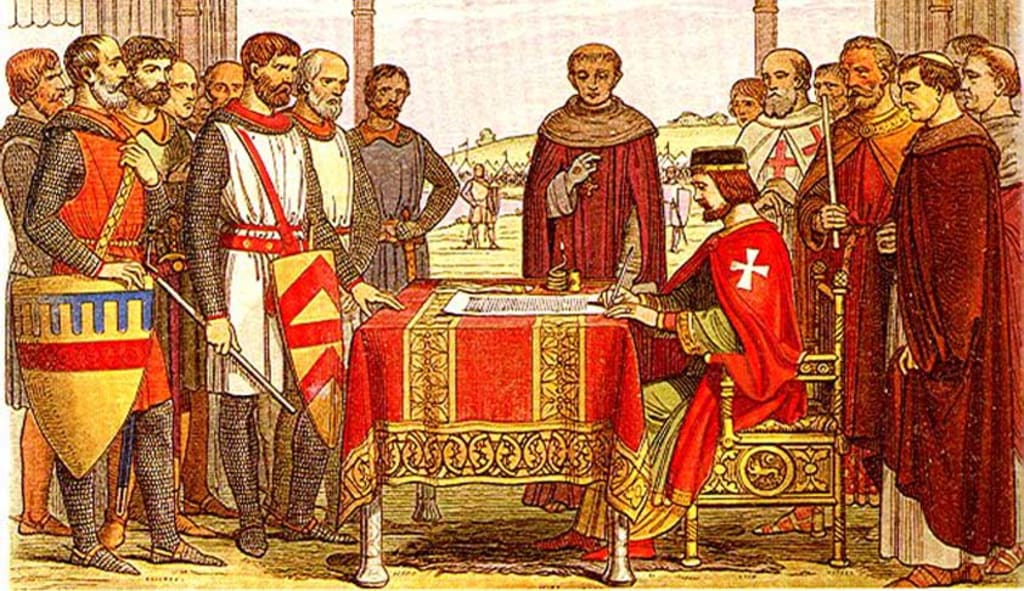
Introduction: The Birth of Legal Principles and Individual Rights
In the annals of history, the signing of the Magna Carta in 1215 stands as a watershed moment, heralding the dawn of constitutional law and asserting fundamental rights that would shape the course of governance and liberty for centuries to come.
The Context of Feudal Turmoil and Royal Authority
In medieval England, King John faced discontent among barons over his oppressive rule and heavy taxation. The Magna Carta emerged as a response to these grievances, seeking to curb the absolute power of the monarchy and establish foundational principles of governance.
Magna Carta: The Great Charter of Liberties
Sealed on June 15, 1215, at Runnymede, the Magna Carta was a document aimed at limiting the king's authority and safeguarding the rights of nobles, asserting principles of justice, fairness, and the rule of law.
Unraveling the Provisions: The Magna Carta's Significance
The Magna Carta comprises a series of clauses that laid the groundwork for legal principles and individual liberties that continue to influence legal systems and democratic ideals worldwide.
Limiting Royal Powers and Establishing Legal Rights
The Magna Carta delineated specific rights, such as protection against unlawful imprisonment, fair trial by peers, and limits on taxation without representation. It established the principle that even the king was subject to the law.
Foundations of Due Process and Common Law
Central to the Magna Carta were principles of due process and the recognition of customary law, laying the groundwork for the evolution of common law, a legal system based on precedent and the interpretation of statutes.
Magna Carta's Enduring Impact on Legal Systems
The Magna Carta's principles of justice and individual rights provided a foundation for legal systems globally, influencing constitutional developments and serving as a blueprint for future declarations of rights and freedoms.
The Evolution of Liberty and Constitutionalism
The legacy of the Magna Carta extends far beyond its medieval origins, leaving an indelible mark on the evolution of constitutionalism and the recognition of individual liberties.
Magna Carta's Influence Beyond England
While initially designed to address specific grievances within England, the Magna Carta's principles resonated beyond borders, influencing subsequent charters, constitutions, and legal frameworks worldwide.
Enlightenment and Democratic Ideals
The Magna Carta served as an inspiration during the Enlightenment era, fostering discussions on democracy, the social contract, and the rights of citizens, contributing to the emergence of modern democratic principles.
Magna Carta in the Modern Era
Even in contemporary times, the Magna Carta's principles continue to inform legal debates, advocate for civil liberties, and serve as a touchstone for discussions on human rights and governmental accountability.
Magna Carta: A Document of Evolutionary Ideals
The Magna Carta's influence extends beyond its original context, representing a fundamental shift in governance and the evolution of principles that continue to shape legal systems and societal values.
Magna Carta's Legacy of Liberty and Rights
The document's emphasis on protecting individual liberties against arbitrary rule laid the groundwork for future constitutional developments, inspiring subsequent generations to demand fundamental rights and freedoms.
Influence on Constitutional Development
The Magna Carta provided a cornerstone for the evolution of constitutional governance. Its principles influenced subsequent constitutional documents, such as the English Bill of Rights (1689) and the United States Constitution's Bill of Rights (1791).
Magna Carta's Global Impact
Despite its medieval origins, the Magna Carta's principles influenced legal and political thought globally, serving as a touchstone for constitutions, declarations of rights, and the rule of law in various nations worldwide.
Magna Carta's Enduring Significance
The Magna Carta's enduring relevance lies in its embodiment of foundational principles that transcend time, continuing to inspire discussions on rights, justice, and the limits of governmental authority.
Magna Carta as a Symbol of Justice and Rule of Law
Its legacy resonates as a symbol of justice and fairness, underscoring the principle that no one, not even the highest authority, is above the law—a fundamental tenet upheld in contemporary legal systems.
Contemporary Relevance and Ongoing Debates
In today's world, the Magna Carta's principles fuel ongoing discussions about the balance between individual freedoms and governmental powers, guiding legal and ethical debates in modern societies.
Magna Carta's Cultural and Symbolic Impact
Beyond its legal and constitutional significance, the Magna Carta holds cultural importance, symbolizing the struggle for rights, the resilience of the human spirit, and the quest for justice across generations.
Magna Carta's Enduring Relevance in Modern Society
The Magna Carta's principles continue to serve as a moral compass, shaping societal values, and inspiring movements advocating for civil liberties, democratic governance, and the rule of law.
Influence on Human Rights Advocacy
Its legacy lives on in the advocacy for human rights worldwide, providing a historical foundation for international declarations and charters that seek to protect and promote individual freedoms.
Upholding Democratic Ideals and Good Governance
The Magna Carta's emphasis on limitations to absolute power remains pertinent in discussions about accountable governance, checks and balances, and the protection of civil liberties in modern democracies.
Magna Carta's Inspirational Legacy
Ultimately, the Magna Carta endures not merely as a historical document but as a timeless symbol of courage, resilience, and the enduring quest for justice and liberty for all.
Conclusion: The Enduring Legacy of Magna Carta's Principles
The Magna Carta remains a beacon of legal and constitutional principles that continue to resonate across generations. Its enduring legacy embodies the timeless struggle for justice, individual freedoms, and the limitations of governmental authority.
The signing of the Magna Carta marked a pivotal moment in history, setting the stage for the development of constitutionalism, the rule of law, and the recognition of fundamental rights—a legacy that reverberates through the corridors of time, inspiring movements for justice and freedom worldwide.
About the Creator
Siva N
Whenever I write a story, I will bite these things
1.Research Prowess
2.Scientific Acumen
3.Storytelling Mastery
4.Attention to Detail
5.Inquisitive Mindset
6.Adaptability and Creativity
7.Structure and Clarity
8.Empathy and Engagement






Comments
There are no comments for this story
Be the first to respond and start the conversation.